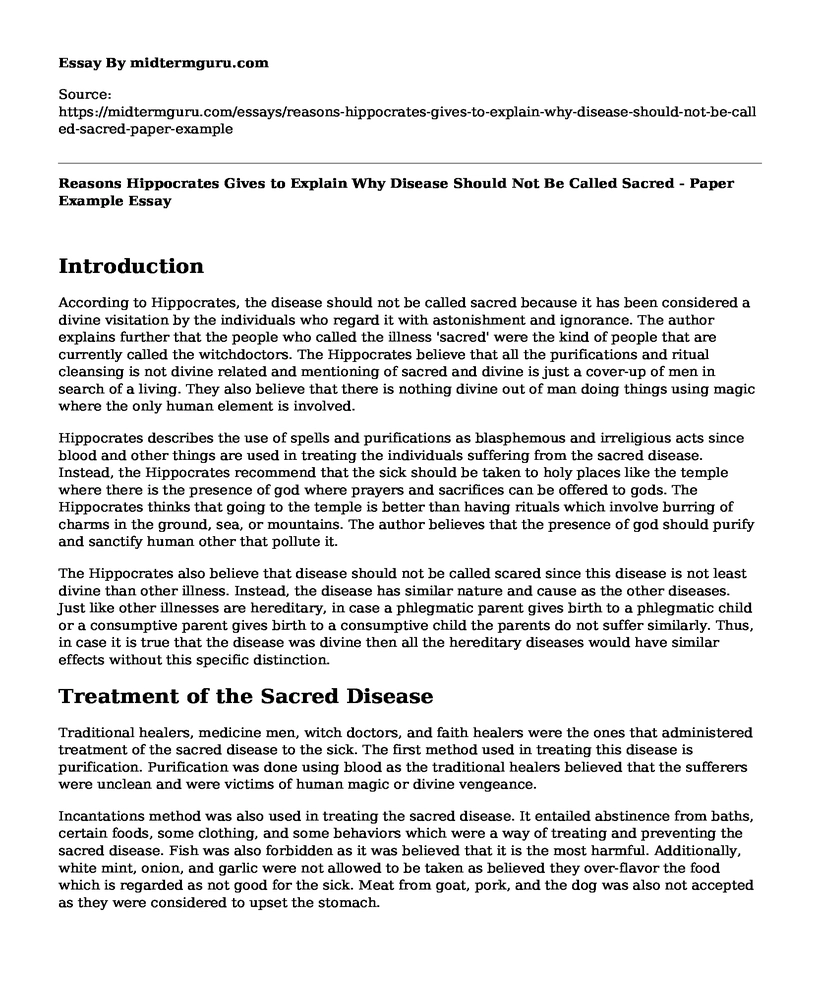Introduction
According to Hippocrates, the disease should not be called sacred because it has been considered a divine visitation by the individuals who regard it with astonishment and ignorance. The author explains further that the people who called the illness 'sacred' were the kind of people that are currently called the witchdoctors. The Hippocrates believe that all the purifications and ritual cleansing is not divine related and mentioning of sacred and divine is just a cover-up of men in search of a living. They also believe that there is nothing divine out of man doing things using magic where the only human element is involved.
Hippocrates describes the use of spells and purifications as blasphemous and irreligious acts since blood and other things are used in treating the individuals suffering from the sacred disease. Instead, the Hippocrates recommend that the sick should be taken to holy places like the temple where there is the presence of god where prayers and sacrifices can be offered to gods. The Hippocrates thinks that going to the temple is better than having rituals which involve burring of charms in the ground, sea, or mountains. The author believes that the presence of god should purify and sanctify human other that pollute it.
The Hippocrates also believe that disease should not be called scared since this disease is not least divine than other illness. Instead, the disease has similar nature and cause as the other diseases. Just like other illnesses are hereditary, in case a phlegmatic parent gives birth to a phlegmatic child or a consumptive parent gives birth to a consumptive child the parents do not suffer similarly. Thus, in case it is true that the disease was divine then all the hereditary diseases would have similar effects without this specific distinction.
Treatment of the Sacred Disease
Traditional healers, medicine men, witch doctors, and faith healers were the ones that administered treatment of the sacred disease to the sick. The first method used in treating this disease is purification. Purification was done using blood as the traditional healers believed that the sufferers were unclean and were victims of human magic or divine vengeance.
Incantations method was also used in treating the sacred disease. It entailed abstinence from baths, certain foods, some clothing, and some behaviors which were a way of treating and preventing the sacred disease. Fish was also forbidden as it was believed that it is the most harmful. Additionally, white mint, onion, and garlic were not allowed to be taken as believed they over-flavor the food which is regarded as not good for the sick. Meat from goat, pork, and the dog was also not accepted as they were considered to upset the stomach.
Wearing black was unacceptable since it signified death for the sufferers. Garments made out of goat's skin and goat skin blankets were forbidden since the illness was believed to be goat related. Behaviors such as putting one foot on the other or one hand on the other were not allowed. Later, if the sick person recovers from the illness, the ritual practitioner is praised, and his/her work is enhanced, whereas if the person dies, the blame is put on the gods as the practitioner claims he/she did not prescribe any medicine
Cite this page
Reasons Hippocrates Gives to Explain Why Disease Should Not Be Called Sacred - Paper Example. (2022, Sep 28). Retrieved from https://midtermguru.com/essays/reasons-hippocrates-gives-to-explain-why-disease-should-not-be-called-sacred-paper-example
If you are the original author of this essay and no longer wish to have it published on the midtermguru.com website, please click below to request its removal:
- Chronic Condition Management - Paper Example
- Essay on Cause of Change in Nursing
- Why I Am Interested in Podiatry? - Essay Sample
- Effects of Dark Chocolate on the Heart: Annotated Bibliography
- Inclusive Healthcare for Vulnerable Populations in Hospital - Essay Sample
- Nurses Unite to Change Healthcare Policies: A Call for Action - Essay Sample
- New Mom: Understanding the Benefits of Vaccines for Infants - Essay Sample







